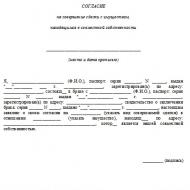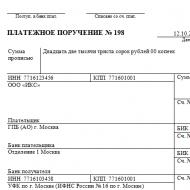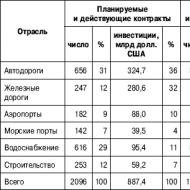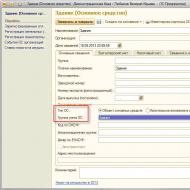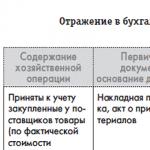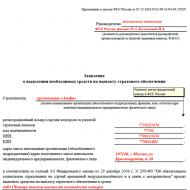
Deductions exceed accruals. How will personal income tax be reflected if an employee’s deductions are greater than his income upon dismissal? Required documents to receive a child tax credit
UNI, for you
The deduction is calculated by year
Letter of the Ministry of Finance of Russia dated 03/01/06 No. 03-05-01-04/41
<О предоставлении стандартных налоговых вычетов>
(published in the “Official Documents” supplement No. 13, 2006)
Maria Shcherbakova, UNP expert
The Ministry of Finance of Russia in letter dated 03/01/06 No. 03-05-01-04/41 gave the go-ahead for summation on an accrual basis standard deductions according to personal income tax, if in a certain month the employee did not receive income. Previously, tax authorities did not allow this to be done (letters from the Federal Tax Service of Russia dated October 31, 2005 No. 04-1-02/844, dated March 10, 2005 No. 04-1-04/66).
Let's explain the situation. The tax base for personal income tax is reduced by standard tax deductions, which are provided monthly for income taxed at a rate of 13 percent (clause 3 of article 210 of the Tax Code of the Russian Federation). But it happens that in one or several months tax period The employee's income is zero. For example, this happens if an employee takes a vacation at his own expense. The question arises: is it possible to transfer the deduction to the following months?
By general rule if the amount of deductions exceeds the amount of income, the base is considered equal to zero. And the difference formed between income and deduction is not carried over to the next tax period, unless otherwise provided by the code (clause 3 of article 210 of the Tax Code of the Russian Federation). Please note that the article referred to is specifically about the inadmissibility of transferring the difference to the next tax period, and not about transferring it within one period (which, remember, is a year).
In addition, Article 218 of the Tax Code of the Russian Federation directly states that standard tax deductions are provided for each month of the tax period. And if deductions were not provided or were provided in a smaller amount, then, at the taxpayer’s request, the tax base is recalculated taking into account the established amounts of deductions (clause 4 of Article 218 of the Tax Code of the Russian Federation).
From this, experts from the Ministry of Finance drew the following conclusions. If the deduction was more than the income for the month or there was no income at all this month, then the standard deduction (or its balance) for this period accumulates. This means that the right to deduction can be exercised in the next month or at the end of the tax period (year).
Let's give an example. In January-October 2005, the taxpayer received a salary of 1,000 rubles. monthly. In November there was no income, but in December he received 200 rubles. The annual income was 10,200 rubles. ((10 months 5 1 thousand rubles) + + 200 rubles), which means the payer has the right to a deduction in the amount of 400 rubles. for each month of the tax period. That is, 4800 rubles. per year (400 rub. 5 12 months).
If the deduction for children is greater than the amount of income
The tax base will be 5,400 rubles. (10,200 - 4800).
Letter from the Department of Tax and Customs Tariff Policy of the Ministry of Finance of the Russian Federation
dated December 28, 2005 N 03-05-01-03/139
In a partial amendment to the clarification dated October 7, 2004 N 03-05-01-04/41 on the issue of providing standard tax deductions, the Department of Tax and Customs Tariff Policy reports the following.
Clause 3 of Article 210 of the Tax Code Russian Federation(hereinafter referred to as the Code) it is established that when calculating income tax individuals the tax base is defined as the monetary expression of income subject to taxation, reduced by the amount of tax deductions provided for in Articles 218 - 221 of the Code.
The standard tax deductions established by Article 218 of the Code are provided to the taxpayer for each month of the tax period, that is, the standard tax deduction is provided by reducing the tax base in each month of the tax period by the corresponding established amount of the deduction.
If the amount of tax deductions in the tax period turns out to be more than the amount income in respect of which is provided tax rate established by paragraph 1 of Article 224 of the Code, subject to the same tax period, then in relation to this tax period the tax base is taken equal to zero. The difference between the amount of tax deductions in this tax period and the amount of income in respect of which the tax rate established by paragraph 1 of Article 224 of the Code, subject to taxation, is not carried forward to the next tax period.
From this provision of the Code it follows that the standard tax deduction cannot be carried forward to the next tax period. As for the cases when during certain months of the tax period the amount of standard tax deductions turns out to be more than the amount of income taxed at a rate of 13 percent, the difference between these amounts is carried forward to the following months of this tax period.
Director of the Department M.A. Motorin
IGROK, Your information is out of date.
Navy, an employee must write an application for deductions only once - when applying for a job. Every year is not necessary. The Ministry of Finance thinks so. But, the employee must inform the accounting department about a change in the situation, resulting in a change in standard deductions, and accordingly, rewrite the application. So where do we have such conscientious employees? Incl. mine are written annually.
For 400 rub. — nothing is needed, only 2-personal income tax for newly hired employees;
for 600 rub. - Birth certificate. If he claims double, then it is a certificate of divorce or death. For the father, there is also confirmation of payment of child support. But in principle, this will be visible in your accounting department.
For a child over 18 years old - a certificate from the place of study that he is studying at a budget full-time department.
That's all.
Deduction of more income upon dismissal
I still can’t fully understand the situation...
The problem is the amount of negative personal income tax that arises for an employee if in the month his income was less than the amount of deductions due to him.
Situation (calculation according to ZUP):
Salary for January = 7800; deductions = 3000; Personal income tax = 624. OK for February = 7800; deductions = 3000; Personal income tax = 624. OK for March = 600; deductions = 3000; Personal income tax = -312 NOT OK As a result, if a person continues to work and his income becomes more than the amount of deductions, look at the 2NDFL certificate FOR THE YEAR, then everything will be normal.
But, if this person quits in March, then we are returning money that does not belong to him?
(0) v8: ZUP look here
I don't want to be the richest man in the cemetery. Going to sleep with the feeling that I did some amazing thing that day is what interests me. Steve Jobs, 1996
ATTENTION! If you have lost the message input window, click Ctrl-F5 or Ctrl-R or the "Refresh" button in the browser.
The topic has not been updated for a long time and has been marked as archived. Adding messages is not possible.
But you can create a new thread and they will definitely answer you!
Every hour on the Magic Forum there are more 2000
Human.
What to do if the employee’s income is less than the standard deduction amount
When the amount of personal income tax deductions exceeds income
Message Irina» 07 Feb 2012, 14:40
If a person who has children does not earn monthly income, they are still provided with a child tax credit for each month of the tax period.
It may also turn out that the amount of tax deductions for the year will be greater than the amount of taxable income.
Then in this tax period the personal income tax base is assumed to be zero.
And the negative difference between deductions and income does not carry over to the next year.
Letter of the Ministry of Finance of the Russian Federation No. 03-04-05/8-36 dated January 19, 2012.
Question:
The individual was on maternity leave from January 27, 2009 (second child), and subsequently was on leave to care for the second child until he reached the age of 1.5 years.
During 2009, an individual received income subject to personal income tax at a rate of 13%, in January, August and October.
In accordance with Letter of the Ministry of Finance of Russia dated August 19, 2008 N 03-04-06-01/254 and Resolution of the Presidium of the Supreme Arbitration Court of the Russian Federation dated July 14, 2009 N 4431/09, if in certain months of the tax period the taxpayer had no income or accrual and payment of income was made not for each month of the tax period, but for several months at once (for example, once a quarter), then standard tax deductions are also provided for each month of the tax period, including those months in which there were no income payments.
Is an individual entitled to receive a standard personal income tax deduction for children for the entire tax period of 2009? If not, then for what months of 2009 is it entitled to receive this standard tax deduction?
Answer:
The Department of Tax and Customs Tariff Policy reviewed the letter on the issue of providing a standard tax deduction for personal income tax and in accordance with Art. 34.2 of the Tax Code of the Russian Federation (hereinafter referred to as the Code) explains the following.
According to paragraph 3 of Art. 210 of the Code for income in respect of which a tax rate of 13 percent is provided, established by paragraph 1 of Art. 224 of the Code, the tax base is defined as the monetary expression of such income subject to taxation, reduced by the amount of tax deductions provided for in Art. Art. 218 - 221 of the Code.
If the amount of tax deductions in the tax period turns out to be greater than the amount of income in respect of which the tax rate established by clause 1 of Art. 224 of the Code, subject to taxation, for the same tax period, then in relation to this tax period the tax base is taken equal to zero.
For the next tax period, the difference between the amount of tax deductions in this tax period and the amount of income in respect of which the tax rate established by paragraph 1 of Art. 224 of the Code, subject to taxation, is not transferred, unless otherwise provided by Chapter. 23 “Income tax for individuals” of the Code.
Installed pp. 4 paragraphs 1 art. 218 of the Code, a standard tax deduction is provided for each month of the tax period and applies to the parent, spouse of a parent, adoptive parent, guardian, custodian, foster parent, spouse of a foster parent who is supporting the child.
According to para. 19 pp. 4 paragraphs 1 art. 218 Code The tax base is reduced from the month of birth of the child (children), or from the month in which the adoption occurred, guardianship (trusteeship) was established, or from the month of entry into force of the agreement on the transfer of the child (children) to be raised in a family until the end of the year in which the child (children) reached age , specified in paragraph. 12 of this subparagraph, or the agreement on the transfer of the child (children) to be raised in a family has expired or been terminated early, or the death of the child (children).
If during the tax period standard tax deductions were not provided to the taxpayer or were provided in a smaller amount than provided for in Art. 218 of the Code, then at the end of the tax period in accordance with paragraph.
ConsultantPlus:Forums
4 tbsp. 218 of the Code, recalculation of the tax base taking into account standard tax deductions provided by the tax agent is carried out by the tax authority, subject to the submission by the taxpayer tax return and relevant supporting documents.
Based on the foregoing, the taxpayer has the right, upon submission of the 2009 tax return and relevant supporting documents, to receive a standard tax deduction provided for each month of the tax period, including those months in which there were no income payments.
Deputy Director
Tax Department
and customs tariff policy
S.V.RAZGULIN
19.01.2012
If the personal income tax deduction is greater than the accrued salary

A standard tax deduction can be applied to the amount of an employee’s income before it is subject to personal income tax based on the provisions of Art. 218 Tax Code of the Russian Federation. By general rule, the formula for calculating personal income tax is as follows:
Personal income tax for the period = (Employee’s income for the period – Standard deductions)*13%
Advance payment
But what if the personal income tax deduction is greater than the accrued salary, and this situation is possible in the following cases:
- The employee's monthly income is relatively small
- the employee had no income during the vacation at his own expense
- the employee has several children
- the worker is the only parent of a disabled child
The law prescribes the following if the personal income tax deduction is greater than the accrued salary:
- The employee has a monthly income
If, when calculating an employee’s personal income tax for a certain period, it includes months when the remuneration is less than the deduction amount, the income is recognized as 0 based on the requirements of Art. 210 of the Code. No tax is paid for these periods.
The legislator has provided for the transfer of the balance of unused deductions to the future. Such a transfer will be recognized as legitimate within one tax period. This is consistent with the provisions of Art. 216 and confirmed by letter of the Ministry of Finance 03-04-06-01/251 08/14/08.
You cannot carry forward the balance of unused standard deductions to next year. This is directly stated in paragraph 3 of Art.
If deductions are greater than income: how to calculate personal income tax
210 and letter from the tax department dated May 29, 2015. BS-19-11/112. This limitation
does not apply to property types of deductions.
Payment of wages
Unused deductions within one year can be provided in subsequent months. This is stated in the letter of the Ministry of Finance of Russia No. 03-04-06/53186, issued on October 22, 2014. in the second paragraph.
- The employee does not have income every month
According to current legal norms and the interpretations of regulatory agencies, standard deductions for personal income tax are due to employees every month, even if wages have not been accrued. The main condition: labor relations were not interrupted during the period when there was no income at all. It is this rule that is enshrined in the official letter of the Federal Tax Service (BS-19-11/112 dated May 29, 2015). This position is based on the decision of the Supreme Arbitration Court, according to which it is stated that Tax code Russia is not prohibited from giving a standard deduction if there is no income. This decision was enshrined in Resolution of the Presidium of the Supreme Arbitration Court 4431/09 on July 14, 2009.
Working on holidays
Position of the Ministry of Finance if the personal income tax deduction is greater than the accrued salary
According to the Ministry, the procedure for providing standard deductions should be as follows:
This position goes against the norms of the Tax Code of the Russian Federation. It will now be easier to prove your point of view thanks to the release of a letter from the Federal Tax Service. This is official document BS-19/11/112 dated May 29, 2015.
If you find an error, please select a piece of text and press Ctrl+Enter.
Category: Banks
Similar articles:
455 Reading time: 4 min.If the tax deduction is greater than the personal income tax, what should be done? You should know that the legislation of the Russian Federation provides for a number of concessions for taxpayers when paying personal income tax (NDFL). First of all, we are talking about the possibility of a citizen applying for a special deduction for income tax. Of course, in order to exercise this right, the obligated entity must provide the fiscal authority with the appropriate grounds. In the practice of applying such benefits, however, sometimes situations arise that require a special approach. For example, the question often arises about what to do if the tax deduction is greater than the personal income tax. It is necessary to find out whether there is a legal tax compensation mechanism for such cases. After all, the use of any state benefits by a citizen, as is known, should not lead to an unjustified understatement of obligations to the budget and other violations that lead to penalties.
How is the amount of income tax taken into account when using a deduction?
It is necessary to understand that a tax deduction of any type - for example, social or, as an option, property - is provided to the payer solely at the expense of those amounts of income tax that he himself transferred to the budget. We are talking about actually repaid obligations to collect personal income tax, the rate of which is, as is known, 13 (thirteen) percent. Thus, if a citizen did not have taxable income and, accordingly, did not pay the corresponding amounts of personal income tax to the budget, he has no right to claim such a deduction.
It turns out that actual size tax compensation (deduction) directly depends on the amount of personal income tax actually paid by the entity to the budget.
The conditional deduction is paid to the citizen in full only when the amount of such compensation either corresponds to the total amount of tax transferred by the payer at the time of registration of the deduction, or is less than this amount.
What to do if the amount of the claimed compensation for income tax paid exceeds the personal income tax amount? It should be noted that the taxpayer in such a situation does not particularly risk anything. Experts say that this phenomenon is considered quite common in practice. Russian taxation. It is more than possible to receive a full tax refund under such circumstances. A taxpayer claiming a deduction in an amount exceeding the amount of tax actually paid should thoroughly understand available ways solving this problem.
Receiving a deduction that exceeds the amount of income tax: options
The various ways to obtain compensation deductions are worth considering in detail, with examples characterizing typical situations.
First opportunity
First apply via tax service part of the declared deduction, corresponding in size to the income tax transferred to the budget at the time of application, and next year - the rest of the compensation, drawn up at the expense of new personal income tax transfers. If necessary, the unused balance of personal income tax compensation can be distributed into several parts and processed gradually in subsequent periods.
Example. In January 2016, a citizen purchased an apartment, paying 2 (two) million rubles for it. The costs incurred allow him to claim compensation in the amount of 260,000 rubles, which is 13% of 2 (two) million rubles. The monthly salary of this subject is 50,000 rubles. A tax of 6,500 rubles is stably withheld and transferred from this income, which is 13% of 50,000 rubles. In 2017, a citizen issues a deduction through the tax service in the amount of income tax paid for the year, which is 78,000 rubles (6,500 rubles multiplied by 12 months). The subject will be able to receive a similar amount of compensation with the same earnings in 2018. The balance of the due compensation is gradually processed in subsequent periods according to the described scheme.
Second possibility
 First part compensation payment issued through fiscal authority, and the rest of the deduction – through the employer (income payer), if any legal opportunity implement such a scheme. Providing compensation to a citizen with this approach will be carried out simultaneously with the monthly withholding personal income tax on paid income. Further receipt of compensation is also made through the employer - until the available balance of the claimed deduction is completely exhausted.
First part compensation payment issued through fiscal authority, and the rest of the deduction – through the employer (income payer), if any legal opportunity implement such a scheme. Providing compensation to a citizen with this approach will be carried out simultaneously with the monthly withholding personal income tax on paid income. Further receipt of compensation is also made through the employer - until the available balance of the claimed deduction is completely exhausted.
Example. Considering the conditional example outlined above, we can assume that a citizen who in January 2017 draws up the compensation due in the amount of 78,000 rubles through tax authority, decides to request the required deduction through his employer and provides him with necessary papers. The compensation is issued to the employee in February, which allows him to receive 71,500 rubles by the end of 2017 (6,500 rubles multiplied by 11 months).
Thus, the citizen’s total deduction for 2017 will be 149,500 rubles, which is the sum of the two requested compensations (78,000 and 71,500). This was made possible by using two available schemes simultaneously. In 2018, however, this entity will no longer be able to apply to the fiscal authority for compensation for personal income tax, since the employer has already provided the required deduction. Meanwhile, the employee will have the right to again apply to his employer for compensation, practicing this scheme until the claimed compensation is fully paid.
Third possibility
You can initially issue a deduction through the employing organization, and then continue to receive the declared compensation according to this algorithm, taking into account the amount of the requested compensation. If the employee receives additional income, subject to personal income tax, he will be able to request the balance of the due deduction through the fiscal authority.
This is an article from the site vseofinansah dot ru. If you are posting this article on another site, then it has been stolen.Example. Appealing to the conditional example discussed above, we can assume that a taxpayer who purchased his own home in 2016 decided to immediately request compensation for it from his employer:
Having issued such a deduction only from February 2016, the citizen receives compensation totaling 71,500 rubles over the remaining 11 (eleven) months.
Continuing to regularly pay personal income tax in 2017 and receive the required compensation through his employer, the subject receives an annual deduction in the amount of 78,000 rubles.
In January 2018, the employee was given a bonus in the amount of 1,000,000 rubles. Deducted from this amount income tax(130,000) allows a citizen to receive the balance of compensation in the amount of 110,500 rubles (the previously compensated 71,500 and 78,000 are subtracted from 260,000).
The amount of personal income tax unused by the taxpayer (19,500 rubles), defined as the difference between 130,000 and 110,500, will be sent to the budget.
Other situations
What to do if the personal income tax deduction is greater than the accrued salary? It all depends on whether the employee has a stable monthly income. The main condition is the continuity of labor relations with the employer paying the citizen wages, even during those periods when the employee actually had no income. If the tax deduction is greater than the employee’s income, then personal income tax is not withheld from him, since such income is considered zero based on the current norms of tax legislation.
2018, . All rights reserved. Copying materials only with the permission of the author.
Income subject to personal income tax at a rate of 13% (except for dividends) can be reduced by the amount of tax deductions. What if these deductions exceed the amount of accrued income? We will talk about cases when the deduction exceeds the accrued salary in our material.
What deductions does the employer provide?
In accordance with Ch. 23 of the Tax Code of the Russian Federation, the employer can provide the employee with the following tax deductions:
- standard (Article 218 of the Tax Code of the Russian Federation);
- professional (Article 221 of the Tax Code of the Russian Federation).
Accordingly, personal income tax, which must be withheld from the income of an individual, taxed at a rate of 13%, will not be calculated from total amount income, but the amount of income reduced by tax deductions provided to the employee.
If there are too many deductions
It is possible that the amount of wages accrued to an employee in a particular month is less than the tax deduction due.
Considering that the employer, as a tax agent, calculates personal income tax on an accrual basis from the beginning of the year (clause 3 of Article 226 of the Tax Code of the Russian Federation), tax deductions during the calendar year are also summed up. Therefore, it is important that the excess of deductions over the salary amount is not just in one specific month, but on a cumulative basis from the beginning of the year.
Let us explain this with an example. The employee is entitled to monthly standard tax deductions in the amount of 2,800 rubles. Salary for January amounted to 26,000 rubles. Personal income tax subject to withholding for January is 3,016 rubles. ((26,000 - 2,800) * 13%).
In February due to going on administrative leave wage amounted to only 2,400 rubles, which is less than the amount of tax deductions. However, taking into account the fact that personal income tax is calculated on an accrual basis from the beginning of the year, the amount of personal income tax on an employee’s income for January-February will be 2,964 rubles. ((26,000 + 2,400 - 2,800*2) * 13%). An over-withheld personal income tax arises, which the employer can offset against the tax subject to withholding in the following months of this calendar year or return to the employee upon his application. If the tax is not offset (for example, due to a lack of future income) or returned, at the end of the year the employee can apply to tax office for the return of personal income tax independently (Article 231 of the Tax Code of the Russian Federation).
About transferring deductions
Transfer of tax deductions due to their excess over the salary amount is possible only within a calendar year. If at the end of the year the total income turned out to be less than tax deductions, the tax base for personal income tax is recognized as zero, and the tax itself is recognized as excessively withheld. However, excess tax deductions are not carried over to the next year, except in the case of a property tax deduction. But even in this case, the employee must provide the employer with a new Notice of the right to deduction (
What to do if the tax deduction is greater than the personal income tax?
When a tax deduction is calculated, its final amount may be greater than the tax for individuals (personal income tax). As a result, many taxpayers are concerned about this and want to know why the tax deduction is greater than the personal income tax.
It is necessary to analyze this issue and understand the existing nuances.
legal information
First, you need to understand what a personal income tax deduction is and how it is calculated.
A tax deduction means a payment in municipal budget from the income (wages) of the taxpayer. The employer, according to the legislation of the Russian Federation, withholds no more than 13%, since this requirement is prescribed by Law 23 of the Tax Code of the Russian Federation.
The total withholding amount is divided into several categories:
- social insurance fund;
- pension fund;
- medical insurance in the Russian Federation.
IMPORTANT!!! In turn, a tax deduction (TD) allows an employee to return part of the taxes paid. It is worth noting that tax deduction payments are made exclusively to that category of citizens who have official employment, i.e. their income is subject to taxation.
Thus, the following persons are recognized as taxpayers:
- citizens of the Russian Federation who are officially employed;
- citizens who are not residents, but receive income in the Russian Federation.
Citizens who are entitled to a personal income tax deduction:
- who spent their income on education for themselves and their children;
- who received an apartment or house at their own expense;
- who spent their money on expensive treatment;
- combat veterans;
- simple category of citizens.
It is also necessary to briefly consider each tax deduction category:
- The first category is general tax deductions. A general tax deduction is provided for children (1 thousand 500 rubles for the first child and 3 thousand rubles for subsequent children). It is provided to parents (mother and father), parents of spouses (grandparents), adoptive parents who are guardians. Disabled children, in turn, will receive at least 12 thousand rubles per month.
- the second category is property deductions. Property deductions are provided to those who have invested their income in building a house or purchasing housing. The amount of deduction for them will be no more than 2 million rubles;
- the third category is social deduction. Social deduction represents reimbursement of citizens' expenses incurred for personal needs: education, donations, treatment, pensions, contributions to a funded pension, etc.;
- The fourth category is a qualified deduction. This deduction is provided to a special category of citizens, for example, individual entrepreneurs. This also includes lawyers involved in notarial activities.
ATTENTION!!! It is worth noting that the tax base for personal income tax is all income of a citizen, which is expressed both in material and in kind.
You need to know that there are incomes that are not subject to personal income tax:
- one-time payments;
- benefits that are state support;
- pensions;
- compensation.
The amount of personal income tax and its impact
As mentioned above, a tax deduction of any category is paid only if the citizen transferred it to the budget. If for some reason the employer did not transfer personal income tax to the state, then the citizen does not have the right to receive a deduction.
IMPORTANT!!! Thus, the final amount of the tax deduction will depend directly on the personal income tax. It can be paid in full to the citizen, provided that the transfer amount is less than or equal to actual value tax Therefore, the question arises, what to do if the amount is significantly larger?
If the tax deduction is greater than the personal income tax, then there is no reason to panic. This situation occurs quite often; it is only necessary to clarify some of the features of this phenomenon. It is quite possible to obtain a tax deduction, and the task is not at all difficult.
The procedure for obtaining a tax deduction if it is greater than personal income tax
If the tax deduction is greater than personal income tax, then in this case a citizen can:
- a citizen has the right to apply for half the tax deduction after 1 year (in this case it is possible to receive the remaining part). At the same time, it will include new calculations made in the tax period for the next year;
- the second method involves registering an IC by submitting an application to the tax office for the first part of the deduction. The second part can be completed through the employer. Thus, in the future you can receive compensation through your employer;
- the third method involves receiving a deduction exclusively through the employer. If a citizen has additional income that is subject to taxation, it will be processed through the Federal Tax Service.
Example:
The employee's salary for May amounted to 20 thousand 475 rubles. In turn, withholding in favor of personal income tax amounts to 2 thousand 662 rubles.
In June, the employee went on vacation, and the salary in this regard amounted to 2 thousand 300 rubles. Thus, the income turned out to be less than the deduction amount, and at the same time excessive deduction occurs. The employer may ask the employee to do the following. You can credit personal income tax in the next tax period or return it with prior notice.
Features of transferring deductions to the next period
The legislation provides for the transfer of deductions to the next tax period for several reasons:
- a citizen's total income for this year turned out to be less than the deduction amount. Excess deductions are not carried forward to the next year, except for property tax;
- The transfer of the deduction is carried out within 1 year.
Every citizen can receive a deduction, but it is necessary to comply with the requirements provided by law. It is worth noting that some types of deductions have a certain statute of limitations. Therefore, in this situation, it is necessary to resolve this issue in advance.
My question concerns over-withheld personal income tax due to the fact that personal income tax deductions for children in August exceeded accrued income. Let me explain the situation: As of 08/03/15, some of the employees went on vacation, vacation pay was accrued and transferred on 07/31/15, when calculating personal income tax, a deduction was applied for children, in August they only have one working day, accordingly, salary accruals are small, and deductions for children, personal income tax is more than accruals (there are such employees who have three children). Accordingly, at the end of the month, a debt arises to employees in the amount of excessively withheld personal income tax, since deductions are provided from accruals on an accrual basis. In August I do nothing, i.e. I don’t withhold personal income tax from them (since there is no base for calculations) and I don’t reimburse them for the excessively withheld personal income tax, but in September this amount will be covered (taken into account when calculating salaries)? It's right? But what about an employee who quits on August 31, 2015; there will no longer be an opportunity to offset the over-withheld personal income tax in September? What to do in such a situation?
Answer
Yes, that's right. In the month when the amount of the standard deduction exceeded the employee’s income, personal income tax is not calculated or withheld, and the remaining amount of the tax deduction is transferred to the next month.
As for the resigning employee, upon dismissal, in addition to his salary, he is entitled to compensation for unused vacation. If these amounts are not enough to cover the standard deduction, then the underused part of the deduction is not provided to the employee and is not subsequently reflected in the 2-NDFL certificate.
Rationale
- Please tell me, is a deduction due if the amount of standard tax deductions during certain months of the tax period turns out to be greater than the amount of income taxed at a rate of 13%?
- We will find the answer to this question in the letter of the Ministry of Finance of Russia dated May 6, 2008 No. 03-04-06-01/118. Thus, if the amount of standard tax deductions during certain months of the tax period turns out to be more than the amount of income taxed at a rate of 13%, the difference between these amounts is carried forward to the following months.*
- Could you explain what you said with an example? How will the provision of tax deductions affect the amount of personal income tax?
- Let’s assume that the employee was on maternity leave until the child reached the age of one and a half years from January 1 to May 1, 2009. On May 2, 2009, she began working on a part-time basis while maintaining child care benefits for up to one and a half years.
Until May, the employee did not receive any income subject to personal income tax from this organization. At the same time, she is entitled to deductions for the entire year 2009, since she has been in an employment relationship with this organization for specified period time. When returning to work, the employee wrote a new application for standard deductions for herself in the amount of 400 rubles. and for a child - in the amount of 1000 rubles. In this case, when calculating earnings for May 2009, the accountant should provide the standard deductions due to the employee starting in January 2009.
If the lump sum deductions due for January - May are not fully provided in May, the balance will be transferred to June. The balance of unused deductions and deductions due for June will be provided in June. Deductions are provided in a similar manner in subsequent months of 2009.
However, we should not forget that deductions are provided with a limitation on the amount of income received. For example, a deduction is provided to a taxpayer for income received since the beginning of the year and not exceeding 40,000 rubles, and for a child - for income not exceeding 280,000 rubles.
If the income received from the beginning of the year in any month exceeds the specified limits, from that moment on the corresponding deduction is no longer provided to the employee.
Please note: income exempt from taxation when determining the specified size limit income is not taken into account.
Standard tax deductions for personal income tax established by paragraph 1 of Article 218 of the Tax Code of the Russian Federation, tax agent must provide the employee for each month of the tax period by reducing the tax base in each month by the corresponding established amount of tax deduction.
If in certain months of the tax period the tax agent did not pay the employee income subject to personal income tax, he must provide him with standard deductions for each month, including those in which there were no income payments. Deductions for past months are summed up and provided as a lump sum in the month the income was received.
Financial department specialists believe that the employer must provide a standard deduction to the employee for the months when she was on maternity leave in which she did not have income payments ().
However, you cannot transfer the unused amount of standard deductions from one tax period to another ().*
Our employee has three children under her care. By law we must provide her for each child double deduction according to personal income tax. However, the worker’s salary is 5,800 rubles, that is, less than the sum of all deductions. How to calculate personal income tax in this case?
There is no need to withhold personal income tax at all.
You are correct: the guardian does receive a double tax deduction for each child. This is what is written in paragraph seven of paragraph 1 of Article 218 of the Tax Code of the Russian Federation. That is, in your case, the amount of “children’s” deductions from an employee every month is 6,000 rubles. And this is not counting the deduction for the employee herself - 400 rubles. (as long as income from the beginning of the year does not exceed 40,000 rubles).
As you can see, the amount of standard deductions will in any case be greater than the accrued salary. In the meantime, there is no need to withhold personal income tax. Moreover, you can transfer the excess amount each time to the next month within one year. Officials from the Russian Ministry of Finance are not against it (see). Only the accumulated difference between deductions and income cannot be transferred to another year (). However, as long as your employee’s salary is 5,800 rubles, the tax base for personal income tax will remain zero. This means that you will not have to withhold and transfer personal income tax to the budget.


